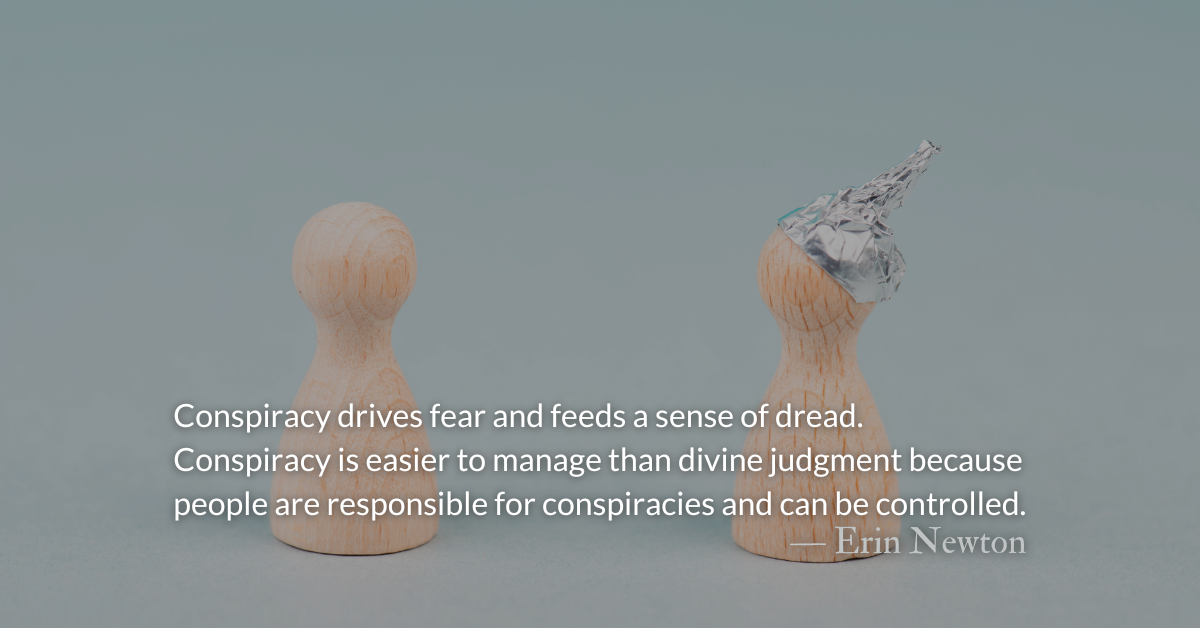Scripture Focus: Isaiah 8:12, 19-20
12 “Do not call conspiracy
everything this people calls a conspiracy;
do not fear what they fear,
and do not dread it.
19 When someone tells you to consult mediums and spiritists, who whisper and mutter, should not a people inquire of their God? Why consult the dead on behalf of the living? 20 Consult God’s instruction and the testimony of warning. If anyone does not speak according to this word, they have no light of dawn.
Reflection: Conspiracy Theology
By Erin Newton
“Trust no one” is the mantra for our day. We have seen the news turn from a daily source of information to headlines judged for signs of misinformation. As a kid, I was thrilled to hear the screeching tones of AOL dial-up internet. Search engines meant access to facts. Now, we question who is behind each website and even squint to count the number of fingers on a possible AI-generated image.
Who can we trust? Where can we go for answers?
The dawn of social media and artificial intelligence did not create a novel threat—it merely reshaped the old struggle to gauge the trustworthiness of our sources.
For Isaiah, the call to avoid untrustworthy sources meant telling the people to avoid “mediums” and “spiritists”—not our modern warning to avoid “that random post by the username GodLovesOnlyMe38128” or the person behind the pulpit who seems to be selling something. Both the ancient medium and the modern internet troll rely on spewing words that stir up our fear.
The warnings in Isaiah are eerily relevant. God told the prophet to distinguish the work of his hand from purported conspiracy, a word that has been tossed around more frequently today. Conspiracy drives fear and feeds a sense of dread. Conspiracy is easier to manage than divine judgment because people are responsible for conspiracies and can be controlled—or so Isaiah’s community thought.
The conspiracy here is unnamed but could be anything such as political upheavals among the divided kingdom or foreign affairs with the Assyrians or Babylonians. We know that religious practices were corrupted, and the prophets were apt to call them out. Jeremiah was accused of conspiracy when he dared to call out the sin of religious leaders. Whatever crisis plagued the people, they were quick to label it a conspiracy rather than divine judgment.
God rebukes foolishness that confuses divine justice with mortal conspiracy. Such foolishness is like consulting a corpse for advice. If you want answers, don’t go to the cemetery. If you need guidance, don’t consult those who use spirituality for a fee.
The place to find trustworthy answers is with God himself. We have his word, passed down through centuries—studied and analyzed more than any piece of writing on this earth. We have access to his Spirit, who dwells within us—the Word itself abides with us. Consult these things, not the voices that bank on your anxiety.
Divine Hours Prayer: The Refrain for the Morning Lessons
Happy are those who act with justice and always do right! — Psalm 106.3
– From The Divine Hours: Prayers for Summertime by Phyllis Tickle.
Today’s Readings
Isaiah 8-9.7 (Listen 3:26)
Psalm 104 (Listen 3:37)
Read more about Absurd Little Bird
Many Birds Aren’t Real participants acted out of frustration with friends and family captivated by Qanon and other absurd conspiracy theories.
Apply or tell a student!
One spot left! (and overflow available) #StudentWritersMonth orientation begins this weekend! #FreeCoaching, seminars by special guests, published work, and a scholarship/stipend.


